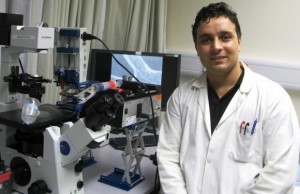December 25, 2015

An Iranian-Australian researcher has developed a system that can cheaply and easily detect cancer cells in tiny blood samples—using a system that is a little like centrifuges enriching uranium.
The new diagnostic tool—now in clinical trials in Australia, Britain, the United States and Singapore—can detect traces of any type of solid cancer—lung, breast, bowel, etc.—without need for a surgical biopsy, and at a tenth of the cost of competing technologies.
The tool was developed by a team at the University of New South Wales led by Dr. Majid Warkiani, 32.
The next step could be a revolution in cancer treatment, not just diagnostics. Warkiani wants to use the technique to filter a patient’s entire blood supply to remove those dangerous cells from a cancer patient’s blood-system—“like a dialysis machine for cancer.”
The initial challenge in developing the early-warning diagnosis system was to find those few cancer cells among billions of healthy blood cells. That challenge was met by a system that—like a centrifuge separating useful from useless uranium—“spins out” and isolates circulating tumor cells (CTCs), which are shed into the bloodstream from a solid tumor and can establish tumors elsewhere in the body—the mechanism by which cancer spreads through the body.
If the filtering system could be scaled up, a cancer patient’s entire blood supply could potentially be similarly filtered, removing the dangerous cells and cycling the rest of the patient’s blood back into the patient. It would be similar to dialysis treatment for kidney patients.
“It would be a revolution in cancer treatment. You would keep filtering out the dangerous cells, prolonging the life of the patient,” said Warkiani. “There is still a long way to go—including securing money and support in Australia—before this is possible.”
In the diagnostic system, a blood sample is put inside a biochip and spun like a centrifuge. “Under those forces that we are applying to the cells inside the chip, the bigger [cancerous] cells go up to the cancer cell outlet, and the smaller cells get pushed down and essentially they get fractionated, they get separated.”
Currently, patients usually need regular scans to check to see that their tumors are shrinking, which cost around $500 per scan. But the biochip can be used instead to monitor the level of cancer cells in the blood, and Warkiani estimates these tests will cost from $35 to $70.
A Singaporean doctor Warkiani met suggested that if the chip could be upscaled, the patient’s own blood could be washed of cancer cells, and returned to the body, similar to the process for kidney dialysis.
Warkiani estimates that with proper funding and support, the technology could be rolled out to Australian hospitals within two or three years.
So far, however, the team has missed out on six government research funding cycles in less than two years.
Dr. Warkiani is a lecturer at the School of Mechanical and Manufacturing Engineering at the University of New South Wales in Sydney. He received his PhD in mechanical engineering from Nanyang Technological University (NTU) in Singapore and undertook postdoctoral training at the Massachusetts Institute of Technology (SMART Center).